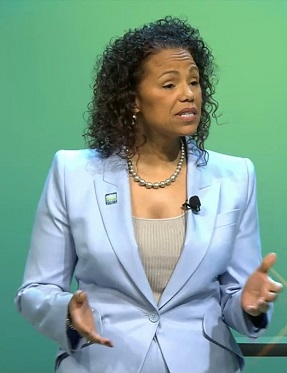HFMA Chair Tammie Jackson: Finance professionals can help the healthcare industry chart a better, more equitable future
- During a presentation at HFMA’s Annual Conference, Tammie Jackson, 2021-22 Chair, said the COVID-19 pandemic represents an inflection point — an opportunity for transformative change.
- Healthcare finance professionals should consider the types of changes they can implement to reduce disparities and promote health equity.
- Jackson, the first Black Chair in HFMA’s history, said everyone likely has experienced being marginalized to some degree, and those experiences can foster the type of empathetic mindset that paves the way for change.
The pivot point marked by the COVID-19 pandemic is a chance for healthcare leaders to guide the industry in a direction that better serves all demographics, HFMA National Chair Tammie L. Jackson, FHFMA, MHA, CHFP, said during a general session Tuesday afternoon at HFMA’s Annual Conference.
Jackson’s chair theme — “Bolder. Brighter. Better.” — reflects the opportunity that lies ahead for healthcare stakeholders.
“What will be the story our industry will write because of the bold initiatives that we have deployed and the bold decisions we have made?” said Jackson, who also is vice president of go-to-market strategy and sales with TransUnion Healthcare.
Thinking about her industry experience working with value-based payment models, including those that strive to address the social determinants of health, Jackson said disparities in disease prevalence, mortality rates and access to care are conspicuous.
Data show that during the COVID-19 pandemic, 3.6 million potential years of life were lost, she said. Of that total, 30% was among Blacks and 31% among Hispanics — disproportionate numbers relative to the U.S. population at large.
Other issues go well beyond the pandemic and affect various marginalized segments, Jackson said. Glaring examples are seen among American Indians, rural Americans, the LGBTQ population and disabled Americans.
“Whether or not you are well-acquainted with these disparities, the numbers are astounding,” Jackson said. “Once we see it, we cannot unsee it. I am hopeful that now that it has been seen, we will not accept that social determinants of health should drive these kinds of results in such inequitable ways and will work to identify what each one of us can do.”

HFMA National Chair Tammie Jackson speaks during a general session Tuesday, Nov. 9 at the 2021 Annual Conference.
What finance professionals actually can do
HFMA members can help usher in the types of changes that give rise to a more equitable healthcare system, Jackson said.
Steps could include designing “a revenue cycle strategy that can be executed equitably across all demographic groups; an accessible digital front-door strategy that makes healthcare more financially attainable for all, regardless of socioeconomic status; or a telehealth strategy that is inclusive,” Jackson said.
“And even if you are not the one that is building these strategies, writing these policies or purchasing or selling these assets, if you become a critical and an important filter to help identify and call out where you see inequities so that we can bubble those up and address them, no matter your role in this industry, there is much that we can do to make bold decisions and promote health equity.”
It’s true that the healthcare industry can’t control the various social conditions that affect health outcomes, Jackson said.
However, “I don’t think that lets us off the hook. … We need to own that we have all been party to this wider set of systems and forces. We have to reflect on what we can do, what we have done and when we have sat idle.”
“Hard questions” that need to be asked, she said, include: “How do we bring people in? We are all here because somebody invited us. Do we reach outside of our normal social circle to pull people in? How do we identify talent for chapter leadership? Are we intentional with our mentoring programs to choose the less-than-obvious individuals? What activities are we coordinating? With our social activities, are we being intentional about being inclusive?”
She added, “We have to widen the lens to make room for people who may not fit in, who may not look like us, who may have a different skill set or background.”
An issue that resonates
The issue of health equity strikes a chord with Jackson, the first Black Chair in HFMA’s 75-year history.
Even for those who have not experienced overt prejudice or discrimination, “I would venture to say that each and every single one of you knows what it feels like to be doubted, to be prejudged — that is, to be marginalized.”
She added that “implicit biases and micro-aggressions” may be the subtext of comments and questions about where someone went to school, what degree they have, why they don’t celebrate Christmas, how long they’ve been in the country or whether English is their first language.
“These micro-aggressions and implicit biases manifest themselves within our revenue cycle, within our clinical practices, within our offices, in our board rooms and, yes, within your [HFMA] chapters.
“You may not be like me, at the intersection of two marginalized cohorts, a female and Black. But everyone knows what it feels like to be marginalized. I ask you to take a minute to reflect on a time when you didn’t feel included, or you felt prejudged, and let that enable you to be empathetic.”
Such a mindset can give way to bold solutions, she said, and those will help “forge a brighter path forward for a better tomorrow.”





